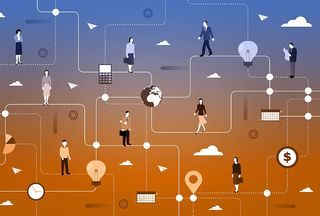Marty Nemko's Blog, page 223
April 19, 2020
A Contrarian View on How We Should Respond to Coronavirus
I have the temerity to believe that my ideas re COVID-19 are wiser than what's being implemented by our world's leaders and leading public health scientists--The leaders are too scared about their re-electability and the public health scientists have a too narrow view: too steeped in protecting all lives equally and indifference to the relative cost of that in terms of the economic curve: the devastation of a larger percentage lives, especially young and middle-age lives relative to the benefit of saving largely very old people with underlying conditions merely so they can live a bit longer to die worse deaths..
These tweets encapsulate my views:
Trump is 73, Fauci 79, Biden 79 (and with quite clear signs of cognitive confusion, Pelosi is 80. Brains, like bodies, do deteriorate with age. We're so damn worried about isms that we don't dare raise this even though their age is increasing the world's existential risk.
A young and an old man are on a boat that springs a leak. The old man falls overboard. If the young takes the time to save the old man, the old man lives. If he lets the old die but fixes the boat, he and boat survive and fish for decades. Any relevance to weighting the medical vs econ curves now?
Today's policy must is egalitarianism over utilitarianism: treat everyone equally, independent of or even inversely correlated with merit. So the coronavirus policies are eviscerating the whole, short and-long-term, mainly the young and middle-aged, to briefly save a small percentage of the old with severe underlying conditions, merely so they can live a bit longer and die worse deaths: e.g., cancer, vegetating strokes, diabetes amputations and sepsis, etc.
A core difference between liberals & conservatives is that liberals tend to believe all lives are equally worth resources. Conservatives tend to think it's wisest to focus on the people most likely to yield the most societal net good, ironically something that Marx advocated.
COVID is a continuum: For most, we don't even know we have it. And of those who do, it's mild. Plus, we don't know the extent of infectability nor intensity and length of immunity conferred across the continuum. Why prioritize massive testing, at giant opportunity cost of money and effort? Isn't it wise to just test the quite ill until a simple, valid at-home swab test exists?
My biggest corona worry is supply chain. Think of the myriad specialized people needed to create everything from medicine to utility components to milk. I worry about the PC term, "social unrest," more clearly: looting & home invasions.
Govt should focus its efforts on subsiding poorly capitalized but promising vaccine research and urging and policing that small percentage of census tracts where the residents have low rates of compliance with social distancing.
I welcome your comments, especially any that argue that the most good for the most people would accrue from the current policies: spend as much as needed to test everyone and try to keep everyone alive even at the existential threat of long-term structural job less and the sequelae of that, and of the government printing yet more money, deflating all of our dollars, and increasing the debt to an existentially unsustainable amount, much of it to the Chinese government, which if it called in our debt, Oy!
Published on April 19, 2020 15:40
April 17, 2020
Low-Risk Business to Start in the Time of Coronavirus
 In just the past four weeks, 22 million people have filed for unemployment, and a good number of them are considering self-employment.
In just the past four weeks, 22 million people have filed for unemployment, and a good number of them are considering self-employment.The obvious ideas including selling corona-related products like masks and sanitizers are too obvious and so the market may already be overcrowded.
The ideas I offer in my Psychology Today article today are less-so and, because they’re service businesses, they require little money to start and run. Might you have the expertise and desire to try one of them?
Published on April 17, 2020 21:30
April 15, 2020
Why Coronavirus Models Fail . . . and how to keep your head amid the ever-changing, often contradictory pronouncements
 It’s easy to be seduced by the word, “model.” Alas, we have short memories. Just weeks ago, respected models predicted cataclysmic shortages of ventilators. That spurred the media to attack government for not doing more. Yet just a week later, the creators of the model that policymakers most rely on and that the media most cites, the IHME model, essentially said, “Never mind.” The model’s prediction of a lack of ventilators and hospital beds proved dramatically wrong.
It’s easy to be seduced by the word, “model.” Alas, we have short memories. Just weeks ago, respected models predicted cataclysmic shortages of ventilators. That spurred the media to attack government for not doing more. Yet just a week later, the creators of the model that policymakers most rely on and that the media most cites, the IHME model, essentially said, “Never mind.” The model’s prediction of a lack of ventilators and hospital beds proved dramatically wrong.Why are models so often wrong? My Psychology Today article today offers explanations and how to keep your head amid the ever-changing, often contradictory pronouncements.
Published on April 15, 2020 21:12
Why Coronavirus Models Fail

It’s easy to be seduced by the word, “model.” Alas, we have short memories. Just weeks ago, respected models predicted cataclysmic shortages of ventilators. That spurred the media to attack government for not doing more. Yet just a week later, the creators of the model policymakers most rely on and that the media cites, the IHME model, essentially said, “Never mind.” The model’s prediction of a lack of ventilators and hospital beds proved dramatically wrong.
The data is too subject to invalidity: too few subjects, not a random selection of subjects, assumptions about the percentage of people who will follow social distancing rules, etc. Most eviscerating to models’ predictive validity is what I call the monkey wrenches: the factors that emerged between the weeks when the data was collected and when policymakers act on the model’s recommendations.
Lest you think the monkey wrenches are few or minor, here are those I learned about just this morning:
NPR reported that most people on ventilators die and most of the survivors are very old and unlikely to have much quality of life for much longer.In a separate report, NPR reported that the coronavirus antibody tests produce many inaccurate results. That means that carriers can march around oblivious to infecting people and that people not-infected are worrying needlessly.CNN reported that a team of Harvard scientists concluded that unless a solid vaccine is developed soon, we’ll need sustained or at least intermittent social distancing not just for months but until 2022. That increases the likelihood of increased problems from domestic violence to supply chain shortages, which could cause the benignly termed “social unrest,” more clearly described as looting and home invasions.Speaking of supply chains, The Institute for Supply Management reported that in just the last two weeks of March, the most recent period studied, supply chains of input manufacturers doubled.CNN reported today that 2,156 New York City cops have tested positive. That’s up from just 100 as of March 24. As of last week, 20% of all New York City police officers were out sick.Politicians and the media have been reporting a flattening of the curve. But today, whoops, he highest daily number of US corona deaths ever.Health care workers, the group most likely to be wearing PPEs, are dying at surprisingly high rates, higher than government-reported data indicates.Multiply what I’ve learned just this morning by the rapidly unfolding situation, and we must very carefully weigh the economic costs of major expenditures and incursions on human daily life against what the models, created a week(s) earlier, says we should do.
Especially in macro decision-making, logic, subjective experience, and yes, data, must all get serious consideration in policy-making.
My personal integration of data, logic, and observing qualitative experience suggests that regarding the coronavirus, we should:Reallocate government resources to support vaccine development and at-home-self-testing (like a pregnancy test) in small, promising companies that are undercapitalized. Focus education and policing efforts regarding social distancing by census tract. Only a tiny percentage of tracts have low compliance.Jurisdictions with low-incidence and a flat curve, especially those in which there are many jobs, should be reopened, but with social-distancing measured urged or required. Large venues such as nightclubs and sports arenas should be closed until a solid vaccine has widely been implemented.Instead of printing more money and increasing existential debt, return to the taxpayer all the money that is being spent on corona handouts, which are heavily fraud-ridden: e.g., self-reported need for taxpayer money.
Published on April 15, 2020 15:01
Career: A blueprint for a game
 Many people have more time amid the Stay-Home edict, and some are looking for a project. I see a gap in the game market: one where the adventure is an opportunity- and peril-filled walk through a career.
Many people have more time amid the Stay-Home edict, and some are looking for a project. I see a gap in the game market: one where the adventure is an opportunity- and peril-filled walk through a career.Although I would be willing to provide the career expertise for the game, I have no programming skills nor the desire to market a board game or video game, so I thought, as my Psychology Today article today, I’d offer my outline of the game, which I’m calling, Career, in case a reader is interested in tackling it or or wants to forward it to someone who might.
Published on April 15, 2020 00:28
April 14, 2020
Feeling Not So Bad Despite the Pandemic
 I'm certainly sad for the countless people affected by the coronavirus pandemic: for example, those who have lost jobs, gotten sick, and yes, died.
I'm certainly sad for the countless people affected by the coronavirus pandemic: for example, those who have lost jobs, gotten sick, and yes, died. Yet I find the sadness modulated by the following. Perhaps one or more of them that I describe in my Psychology Today article today might at least modestly improve your state of being:
Published on April 14, 2020 21:12
April 13, 2020
Upskilling in the Time of Coronavirus
 Do any of these describe you?
Do any of these describe you?You’re employed but have more time amid the stay-home edict and want to up your game so you can improve your career trajectory You’re employed but worried you’ll join the 16.6 million people, one in 10 workers, who have lost their job in the past three weeks because of the economic shutdown.You’re unemployed and amid that vastly increased number of unemployed people, you’re deferring looking for a job, and in the meanwhile want to upskill to improve your prospects of landing good work when the job market improves.You’d like to do something more useful with your time than playing board games, cleaning out your closets, and making elaborate recipes.My Psychology Today article today offers some ways to upskill.
Published on April 13, 2020 21:12
Feeling Not-so-Bad Despite the Pandemic
 Of course, any reasonable person is sad for the countless people affected by the coronavirus pandemic: for example, those who have lost jobs, gotten sick, and yes, died. I certainly am sad about it.
Of course, any reasonable person is sad for the countless people affected by the coronavirus pandemic: for example, those who have lost jobs, gotten sick, and yes, died. I certainly am sad about it.Yet I find the sadness modulated by the following. Perhaps one or more of them that I describe in my Psychology Today article today might at least modestly improve your state of being:
Published on April 13, 2020 21:12
Five Virulent Corona Scams That Can Fool Even Smart People
 The scammers must be as addicted to coronanews as we are, because their scams sure are capitalizing. As President Obama's Chief of Staff Rahm Emanuel famously said, “Never let a good crisis go to waste.” In just the first nine days of April, the Federal Trade Commission reported $7 million lost to scams.
The scammers must be as addicted to coronanews as we are, because their scams sure are capitalizing. As President Obama's Chief of Staff Rahm Emanuel famously said, “Never let a good crisis go to waste.” In just the first nine days of April, the Federal Trade Commission reported $7 million lost to scams.My Psychology Today article today describes a current rogue’s gallery of coronascams and how to avoid them.
Published on April 13, 2020 00:14
April 11, 2020
The All-Ins: Those people who work hard even in the absence of an emergency
 In recent years, we’ve often pathologized people who emphasized the work part of work/life balance as "workaholic," as though they were addicts, like alcoholics.
In recent years, we’ve often pathologized people who emphasized the work part of work/life balance as "workaholic," as though they were addicts, like alcoholics.Even in the absence of an emergency, these All-Ins especially deserve recognition. I attempt to provide some in my Psychology Today article today.
Published on April 11, 2020 21:12
Marty Nemko's Blog
- Marty Nemko's profile
- 4 followers
Marty Nemko isn't a Goodreads Author
(yet),
but they
do have a blog,
so here are some recent posts imported from
their feed.



